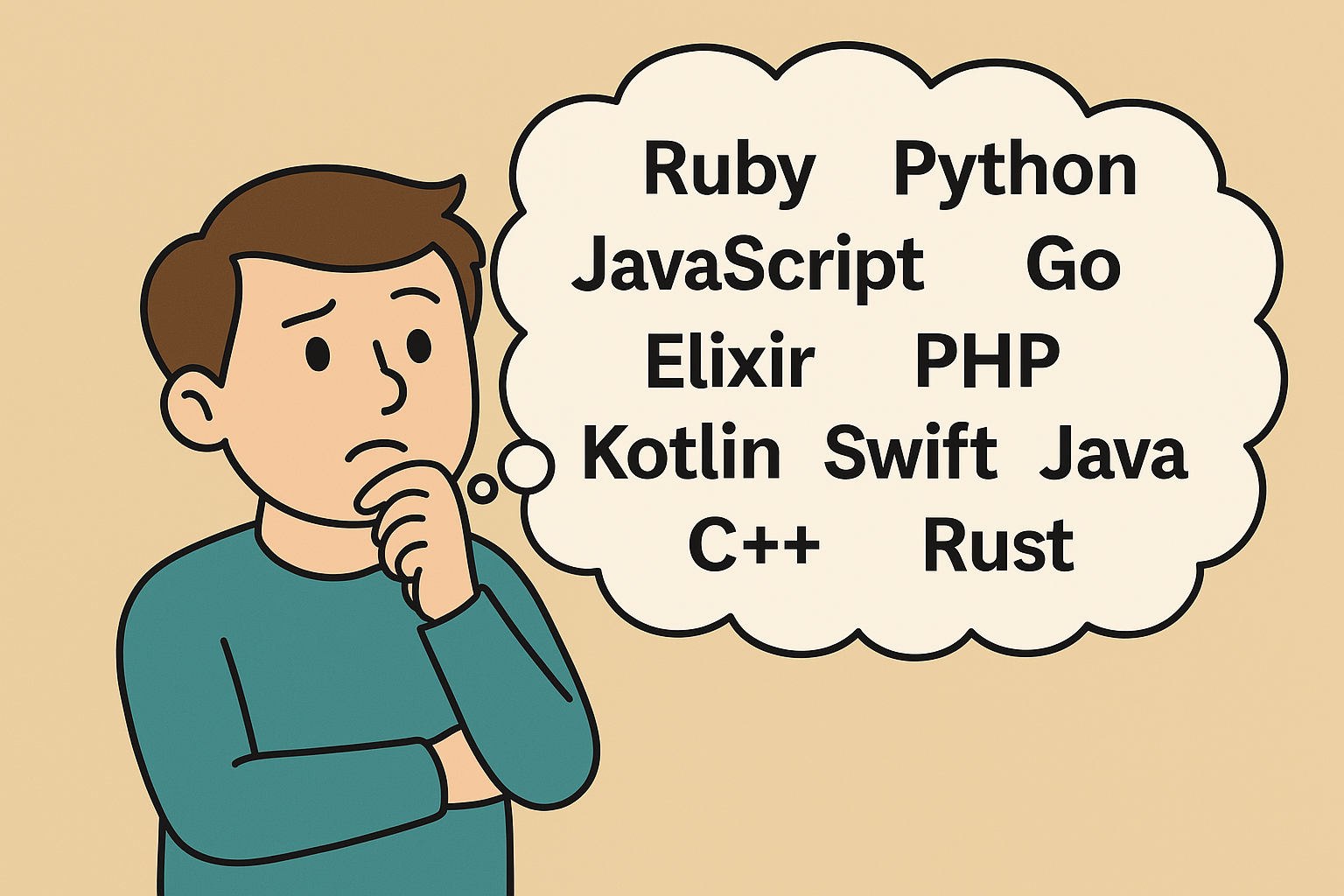
Choosing Your First Programming Language: A Guide for New Developers
Description
Are you ready to dive into the world of software development? That's awesome! But once you've decided to learn programming, the next step is determining what language to learn.
While this may seem like a simple decision, it can become overwhelming with all the different programming languages. In this article, let's discuss some different languages and why you might want to choose one over another.
Look Past the Hype
The first thing I want to discuss is that—despite what you may read online—there's no "best" programming language. The tech world loves trends, but the reality is that different programming languages shine in different ways.
Some languages offer a gentler on-ramp to coding concepts while still providing practical, marketable skills. One language that fits this is Ruby, which stands out for its beginner-friendly design combined with real-world power.
Aligning With Your Career Vision
The job you want should influence which language you decide to learn first:
Web Application Development: While JavaScript dominates front-end development, Ruby—especially when used with the popular Ruby on Rails framework—offers an incredibly productive environment for building full-stack web applications. Companies like Airbnb, GitHub, and Shopify were all built with Ruby on Rails.
Startup Environment: Ruby on Rails continues to be a favorite in startup ecosystems due to its emphasis on developer productivity and rapid prototyping. If you're drawn to the startup world, Ruby provides an excellent foundation.
Mobile Development: If you want to build iOS applications, then Swift is your go-to. For Android, Kotlin has become the preferred choice.
Data Analysis and AI: Python is the best language for data analysis.
Game Development: Unity favors C#, while Unreal Engine relies on C++. These environments can be more complex, which can make them more challenging as a first language.
The Job Market
If you want to learn programming just to learn it, that's great, and you can skip to the next section. But if you want to become a professional software engineer, here are some things to consider when picking your first language.
Market Demand: Python and JavaScript jobs generally have the most open positions.
Industry Positioning: Ruby occupies a sweet spot in web development and business applications. Rails developers are particularly valued for their ability to rapidly build and deploy complex web applications—a skill set that remains in consistent demand.
Community: You should always consider a programming language community when deciding to learn the language, but this is even more important when it's your first language. Pick a language with a vibrant external library ecosystem and a helpful community that offers quality resources to help people learn. More people using the language generally translates to more jobs writing that language.
Enjoyability
Your enjoyment while programming can dramatically affect your persistence and success.
Syntax That Clicks: The syntax of every programming language is different. Some prioritize brevity, others readability, and some mathematical precision. Finding a language whose syntax patterns match your style of thinking can make a big difference in your learning experience and enjoyment. Learning accelerates and becomes more enjoyable when writing code feels intuitive to you.
Early Wins: Being able to build something is crucial for maintaining motivation. Nothing can crush motivation more than spending hours stuck on a problem and not making progress. Languages with robust frameworks or libraries that make it easy to handle common tasks can help you create projects sooner. The key to learning and enjoying programming is to see your code come to life—whether it's a web page, data visualization, or a simple game.
Appropriate Learning Gradient: The ideal first language introduces important programming concepts in digestible pieces. It should strike a balance—challenging enough to teach important principles but not so complex that you're fighting the language more than learning to code.
Practical Starting Points for Newcomers
Learning Resources: The quality of learning resources varies among programming languages. Look for languages with clear, up-to-date documentation, plenty of tutorials for beginners, and comprehensive guides that explore both beginner and advanced topics. Video courses, interactive platforms, and well-written books can all be great ways to learn.
Development Environment: Some languages require complex setup procedures or powerful hardware, while others can run with minimal configuration. As a beginner, languages with straightforward installation instructions can help you get running quickly so you can focus on learning to code.
Community Atmosphere: Programming communities develop their own cultures and values. Some are known for being particularly welcoming to newcomers, with active forums, helpful Stack Overflow tags, and mentorship opportunities.
Making Your Choice
Still weighing options? Here's my recommendation:
Ruby excels as a first language. It balances readability, practical application, and a supportive learning environment. Ruby on Rails builds on this foundation by letting you create web applications quickly. The Ruby community is also known for being welcoming and having lots of great learning resources.
Having said that, take into account your specific circumstances:
- If you're certain you'll be working exclusively with data science, Python might be a more direct route.
- JavaScript makes more sense if you're solely interested in front-end visuals and interactions.
- If you're targeting enterprise environments dominated by .NET, C# could be advantageous.
Remember that your first language is just the beginning. Most professional developers become comfortable in multiple languages throughout their careers. The critical programming concepts you'll learn with Ruby—objects, methods, variables, control flow—will benefit you regardless of which languages you learn later.